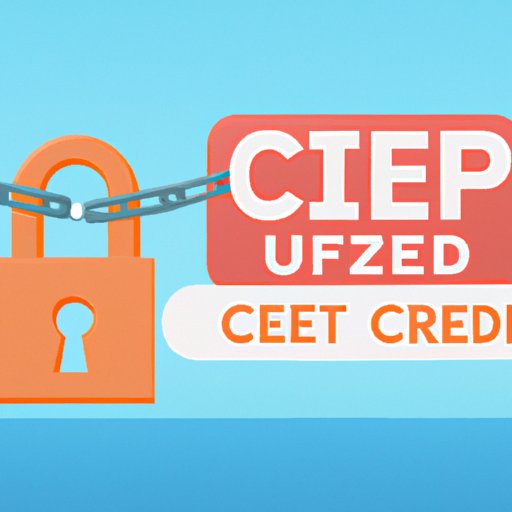Introduction
Credit locking is an important tool for protecting your credit and identity. Credit locks provide an extra layer of security by preventing unauthorized access to your credit reports. By learning how to effectively lock your credit, you can keep your personal information safe and secure.
This article will cover the basics of credit locking and provide step-by-step instructions on how to monitor your credit reports, place a security freeze on your credit reports, use strong passwords for online accounts, sign up for fraud alerts, avoid providing personal information over the phone, and opt out of pre-approved credit card offers.

Monitor Your Credit Reports Regularly
The first step in locking your credit is to regularly monitor your credit reports. Checking your credit reports on a regular basis will help you stay informed about any changes or suspicious activity on your accounts. You can check your credit reports for free once a year from each of the three major credit reporting bureaus: Experian, TransUnion, and Equifax.
When reviewing your credit reports, look for any incorrect information or suspicious activity such as unauthorized accounts or inquiries from unfamiliar sources. If you notice any discrepancies, contact the credit bureau immediately to report the issue and have it corrected.
Place a Security Freeze on Your Credit Reports
A security freeze is one of the most effective ways to lock your credit. A security freeze places a restriction on your credit reports, preventing anyone from accessing them without your permission. This means that lenders, landlords, and other third parties will not be able to view your credit reports unless you specifically authorize it.
In order to place a security freeze on your credit reports, you must contact each of the three major credit bureaus individually. Most states require you to provide proof of identification and a small fee in order to place a security freeze. Once the freeze is in place, you will receive a unique PIN or password that you can use to temporarily lift or permanently remove the freeze if needed.
Use Strong Passwords for Online Accounts
Using strong passwords for all of your online accounts is another important step in locking your credit. Create passwords that are at least eight characters long and include a combination of upper and lowercase letters, numbers, and symbols. It’s also important to use different passwords for each account and to change them frequently.
When creating new passwords, avoid using easily guessed words or phrases like your name, address, birthdate, or Social Security number. Additionally, make sure to store your passwords securely and never share them with anyone else.

Sign Up for Fraud Alerts
Fraud alerts are another way to protect your credit. Fraud alerts are notifications sent to lenders and other third parties when someone attempts to open a new account in your name. When a fraud alert is triggered, the lender must take additional steps to verify your identity before they can open the new account.
You can set up fraud alerts with each of the three major credit bureaus. Most fraud alerts last for 90 days, but you can renew them as needed. You can also opt for an extended fraud alert, which lasts for seven years.

Avoid Providing Personal Information over the Phone
Identity thieves often use phone scams to get access to your personal information. Never give out your credit card number, Social Security number, or other sensitive information over the phone. Be wary of callers who ask for money or promise something in return for payment. Hang up immediately and report the call to the authorities.
If you receive a call from someone claiming to be from a legitimate organization, don’t give out any personal information until you have verified the caller’s identity. Ask for their name and contact information, then contact the organization directly to confirm the call.
Opt Out of Pre-approved Credit Card Offers
Identity thieves often use pre-approved credit card offers to open fraudulent accounts in your name. To reduce your risk of becoming a victim of identity theft, opt out of pre-approved credit card offers. You can opt out of receiving pre-approved offers from all three major credit bureaus by visiting their websites.
You can also register with the National Do Not Call Registry to limit telemarketing calls. This will help reduce the amount of unsolicited offers you receive, including pre-approved credit card offers.
Conclusion
Credit locking is an important tool for protecting your credit and identity. By monitoring your credit reports regularly, placing a security freeze on your credit reports, using strong passwords for online accounts, signing up for fraud alerts, avoiding providing personal information over the phone, and opting out of pre-approved credit card offers, you can help keep your personal information safe and secure.
By following these steps, you can ensure that your credit and identity remain protected. So take the time to lock your credit today and enjoy the peace of mind that comes with knowing you’ve taken the necessary steps to safeguard your financial future.
(Note: Is this article not meeting your expectations? Do you have knowledge or insights to share? Unlock new opportunities and expand your reach by joining our authors team. Click Registration to join us and share your expertise with our readers.)
